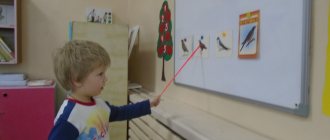Spice up your conversations with games
How else can you attract the attention of the guys? Any description of a thematic conversation in the middle group suggests that children will definitely find such activities interesting if they are diluted with various games. This keeps them in a good mood and creates a positive attitude towards everything that happens. For example, you can create the appearance of a telephone conversation, or ask someone who knows more polite words.
As a result, we can say that the integrated use of various types of activities is an excellent means of enhancing educational work with children in preschool institutions.
Abstract of OOD for the senior group. Daily regime
Summary of organized educational activities “Daily routine”
Abstract of an educational activity for children 5-6 years old on the topic “Day routine”
Author : Natalia Aleksandrovna Frolova, teacher of the MDOU combined type kindergarten No. 42 “Teremok”, Serpukhov. Description of the material : This is a summary of an educational organized activity in which children become familiar with the daily routine and learn to draw logical conclusions. The material is intended for educators and additional education teachers. It will be useful for children of older preschool age. Goal : the importance of the regime in maintaining and promoting health. Objectives : To form an idea of the daily routine, the ability to distinguish behavior that promotes health from behavior that is harmful to health. Convince of the need to follow a daily routine to maintain health. Learn to correlate different parts of the day with your own activities. Preliminary work : Educational games: “Confusion”, “Good - Bad” Didactic games: “Learn sports”, “Regular moments”. Reading fiction: K. Chukovsky “Moidodyr”, “Fedorino’s grief”, A. Barto “The grimy girl”, G. Shalaeva “Rules of behavior for well-mannered children”, “The Tale of Lost Time”, riddles about health, proverbs and sayings. Role-playing games “Hospital”, “Pharmacy”, “Family”. Equipment : Audio recording, letter, picture diagrams of hand washing, brushing teeth. “Daily routine” in the shape of a round clock with arrows, the game “Place it in order”, package: material for applique, book. Methodological techniques : creating a game situation, didactic game, surprise moment. Progress of OOD The song “Smile” sounds, music by V. Shainsky, words by M. Plyatskovsky. Emotional tuning . - Guys, what are your mood today? ( Good, joyful, fun
e.) Let's hold hands and convey our good mood to each other.
All the children gathered in a circle.
I am your friend and you are my friend. Let's hold hands tightly and smile at each other .
-A smile is the key to a good mood. By smiling, we give each other health and joy. What else helps you maintain a good mood? ( children's answers: kind words, good health
.) A letter arrived at our kindergarten. Is it very strange?!
The riddle will help you find the answer! The alarm clock rang.
Time calls everyone: Mom to the workshop, Dad to the factory ... (
watch ) Questions for children : -Why did man invent a watch? -It is this question that we will try to answer together today. Let’s get acquainted with the new rule of maintaining health “Keep a daily routine.” -What is the daily routine? -Let's discuss the question, where should the morning begin? -charging; -water procedures; -roads to kindergarten. Educator : Is everyone’s morning so organized? Reading of L. Voronkova’s poem “Masha the Confused One .” Once upon a time there lived a girl Masha.
In the morning the sun rose and looked in the window. And Masha is sleeping... -Why was Masha late for kindergarten?
-What can you advise her? -How do you feel about your things? -What is a regime? Educator : -The daily routine is the schedule of all the tasks and actions that you need to perform during the day. The human body has one feature that should not be forgotten. He tries to follow his internal schedule and suffers when this order is violated. For example, you were playing in the yard and completely forgot that it was already time for lunch. How do you know when you are hungry, what will you feel? ( Children's answers
.) - It was your body that gave the signal that it was time for lunch.
He is used to receiving food at a certain time. Dynamic pause
Educator : In our routine, in the morning there is exercise, All without exception, let's remember the exercises. Hello, hello, brother Chas Tick-tock, Tick-tock!
(Children shake their hands left and right)
Look at us quickly!
Tick-tock, Tick-tock !
(Turn their hands with their palms towards themselves, wave their palms towards themselves, then swing their hands left and right again) All the guys want to know, Why is the clock knocking
?
(“Threaten” with the index finger of the right hand) Tick-tock, Tick-tock!
Tick tock, tock !
(Clap their hands rhythmically) Educator : - How do you know that you are tired? ( Children's answers
) - How do you know that you want to sleep?
( Children's answers
) -How do you know what you want to drink?
( Children's answers
) - Guys, why do you think we need a watch?
( in order not to be late, to know what time it is
) - Yes, you are right, we need watches so that we can navigate time, know when to wake up, so as not to be late for kindergarten for morning exercises, in order to know when lunch is coming , walk and sleep time.
So what is a regime? ( children's expected answers are doing things at the same time
).
-Yes, a routine is when all tasks are completed during the day according to time, for example, like in kindergarten. You have time to eat, study, walk, sleep and go home. Your parents are also familiar with this gardening routine, and the clock shows the time the daily regimen is completed. -Guys, why do you think some children have time to: go for a walk with friends, study in a circle, help around the house, and read a book. And others only have promises and complaints that they didn’t have time, they will do it tomorrow. Why is that? What do you think? ( do not follow the daily routine
)
Educator : If you do not follow the correct daily regimen, violate the internal routine, the body will get angry and quarrel with you. You sit down at the table to have dinner, but you have no appetite. Everything seems tasteless. You go to bed later than usual and can’t fall asleep. It's time to get up, but your eyes are stuck together, your arms and legs don't obey, your head leans towards the pillow. The conclusion is this : it is necessary to maintain the correct daily routine - sleep, eat, walk outside, play and exercise at a certain time. Then it is easy for the body to work, and you will feel healthy and vigorous. Educator : This secret is the daily routine. The regime helps you to be disciplined, helps you improve your health, and complete your work and tasks well and efficiently. A routine is when all your tasks are distributed clearly over time during the day. Educator : And now I want to know if you follow your daily routine.
Task “Place in order” . The guys go to the board one by one and, in order, lay out pictures depicting children engaged in various activities during the day.
As the game progresses, attention is drawn to the fact that you need to go to bed on time and get up on time, do morning exercises every day, and eat at the same time. You can't watch TV for a long time .
-You agree with me? ( the meaning of all the pictures is explained
) -To be cheerful and healthy, you need to go to bed at the same time.
-Do you know why you need to eat at the same time? -Imagine that you have a little stomach man living inside you. If you feed him at different times, he will be capricious and sick. It will hurt not only him, but also you. Therefore, he must be accustomed to eating at the same time, then you will become friends with him. Now we will meet another friend, but you must guess who he is. I am the cheerful washbasin The head of the washstands And the commander of the washcloths Who is this ... ( Moidodyr
).
-Are you guys familiar with Moidodyr? Today he sent not only a letter, but also a parcel to the kindergarten address. “Letter to all children on a very important matter” : “Dear, my children! I am writing you a letter. I ask you to wash your hands and face often. It doesn’t matter what kind of water: boiled, spring, from a river or from a well, or just rain. You must wash yourself: morning, evening and afternoon. Before every meal, before bed and after sleep! Rub with a sponge and washcloth, be patient, no problem! Both ink and jam will be washed away by soap and water. Dear ones, my children! I really, really ask you to wash more often, wash more cleanly. I can’t stand dirty people, I won’t give a hand to dirty people. I won’t go to visit them. I wash myself very often. I’d like to come to you, but on one condition. I will give you a task - Pass the test If you solve everything - Wait for me to visit. -What do you think about it? -Can you handle it? -Now, guys, don’t yawn, I’ll start, and you finish. 1. Remember firmly that the regime for people... ( is necessary
).
2. We are accustomed to order, in vain we don’t lie in bed, in the morning we do ... ( charge
), keep our ... (
regime
).
3. Strengthen your muscles so that you can exercise... ( physical education
).
4. Dress, shoes and housing should be as ( clean
) as possible.
water
always help us .
Well done boys! You answered everything correctly and unanimously. Now raise your hands who does exercises in the morning. Wellness break - Let’s rest a little, then we’ll start discussing further. -Show your favorite exercises. Now let’s see what we have in the package. ( Material for application
)
Collective application “Daily Routine ” Children are invited to stick on a sheet of paper designed in the form of a clock, paste ready-made forms of fairy-tale characters and animals performing various routine moments
(sleeping, eating, walking , reads, plays, does exercises) to the appropriate place on the clock.
Educator : According to the daily routine, we now have a second breakfast, and for breakfast today we will have “Vitamin” fruit salad. Reflection : -What new did you learn today? -Which of the tasks did you find most interesting? Why? -You all tried very hard today, were active, attentive, and friendly. And here is our guest and friend.
Moidodyr thanks the children for their work in class and gives them a book.
We recommend watching:
Abstract of a thematic conversation in the senior group. Notes of the OOD on application in the senior group. Notes of the OOD in the senior group on drawing. Tree leaves Abstract of OOD in the senior group. Manual labor
Similar articles:
Developmental lesson in the senior group of preschool educational institutions
Drawing lesson for senior group
Summary of educational activities in the senior speech therapy group on the topic “Construction”
Summary of joint activities of the teacher and children of the senior speech therapy group on the development of fine motor skills of the hands
Notes on the formation of elementary mathematical concepts in the senior group for children with mental retardation
Morning conversations are part of the daily routine
One more thing. Morning conversations with children in the middle group are part of every child’s daily routine. Before starting mental and work activity, as well as rest, it is extremely necessary to talk with the kids on a certain topic. Such a regime is considered to be well-designed, and therefore has great pedagogical significance.
Daily morning conversations accustom the child to a certain rhythm, help provide the body with a change in activity, that is, protect the nervous system from overwork. Accordingly, all the components of the daily routine help to form strong dynamic stereotypes of life activity. In a word, a conversation in the morning is an important moment in the life of not only every child. In the future, as he grows up, he will, out of habit, receive an energy release by relaxing in the morning while talking with his family and friends.
How to plan the topics of conversations?
So where to start? Firstly, in every modern preschool educational institution there should be a file of conversations with children in the morning in the middle group. This significantly facilitates the teacher’s work, being a necessary condition for successful work with children. As a rule, conversation plans are arranged in alphabetical order by content. This makes it much more convenient to search for exactly what you need. The topic can be very different: seasons, holidays, and rules of cultural behavior. Much, of course, depends on the approved program. But exactly how the conversation will be conducted depends on the teacher.
And one moment. Both teachers working in the same age group draw up conversation plans. By fulfilling this condition, they have a unified approach to children and uniform requirements for them. Shift teachers must have daily contact at work, constantly share their opinions on the results of observing children after conversations with them: how the material was learned, how the little ones perform their duties, what skills of cultural behavior they have learned.
What should the teacher monitor?
Naturally, although the program is the same, the plans for each group are somewhat different. The methodology of work, the process and methods of teaching - all this depends on the educators. Therefore, a conversation with children in the middle group in the morning on the same topic can go completely differently.
But in any case, the teacher is obliged to ensure that everything is carefully thought out at least a week in advance. At the same time, children should not be overloaded (or, conversely, underloaded). Perhaps at some points there will even be separate questions for some kids. That is, you need to prepare for the conversation thoroughly. The planning is specific - it must be absolutely clear in which shift which teacher conducts what.
Pay attention to the smallest details
A conversation with children in the middle group in the morning is carried out necessarily taking into account the physical, intellectual and emotional stress. In this case, it is necessary to use a variety of techniques - verbal, visual and even educational games. During the conversation, medical requirements for duration, sequence and other features of the conversation are also taken into account.
We should not forget about the level of development of children. Each child requires an individual approach. The relationship between the process of development, training and education is also an important point. Of course, it is worth including some elements of activity that promote emotional release, create a good mood, and bring pleasure.
Conversation with children in the middle group in the morning: planning features
So how does this all happen? First, the teacher needs to figure out how to plan short conversations with a group of children in the morning. That is, what goals will be set, what rules and sequence of actions will be developed, what results are expected.
In a word, the plan of conversations in the middle group is a condition for the organization of work and purposefulness of the teacher, protection from gravity, from missing any significant development tasks. The most important thing is to try to evenly distribute the program material throughout the year, avoiding haste and overload, and consolidate it in a timely manner.





